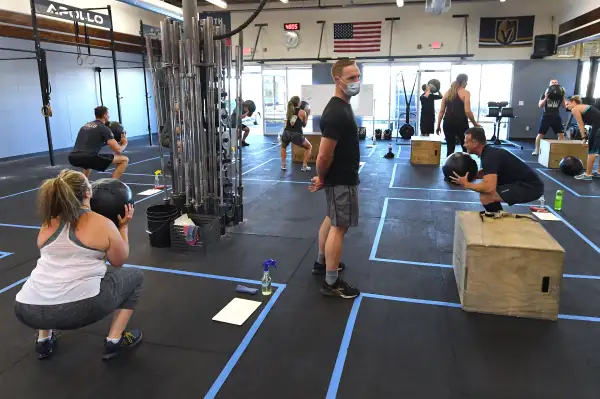Coronavirus Liability Waivers Are Popping Up at Gyms, Restaurants and Shops

Julie Socher is hoping to reopen her photography studio sometime in July after nearly three months shuttered. While waiting for the green light from government officials in Alexandria, Va., she’s been making changes to reduce coronavirus risks for herself and her clients. Among them: drawing up a waiver for clients to sign before they work together.
As Americans return to their favorite gyms, salons and restaurants, waivers will be part and parcel of the experience, legal experts say.
Rachel Brenke, a small business attorney from Fredericksburg, Va., is now recommending waivers to her business clients as part of a three-piece legal plan that also includes liability insurance. "Normally waivers are associated with risky businesses, like rock climbing or sky diving," Brenke says. "But now COVID makes most businesses inherently risky."
Tom Coale, a land use attorney from Columbia, Md., has been inundated recently by client requests to design waivers. “Businesses have liability just by having clients on their property,” he says. “In the current situation, if they don’t take reasonable precautions to protect customers and clients, they are vulnerable.”
While receiving a waiver might make some consumers nervous, Brenke says that it shouldn’t. You’re not signing away your right to sue entirely, she says.
But you do need to understand what the forms mean. In this uncharted territory, here’s what you need to know about the waivers you'll soon be asked to sign.
Where to Expect Liability Waivers
Socher hadn’t even considered designing a waiver until a local group of photographers brought the topic up in an online discussion. It sounded like a legitimate idea, she said, and after consulting with her attorney, she decided it was a smart move.
She hopes having clients sign waivers ensures she is released from liability should a customer become sick. "I’m putting everything in place to mitigate risk of infection," she says, "but this ensures the clients understand that they are assuming the risks associated with the pandemic. It’s an agreement that acknowledges I’m trying to make both parties safe."
Coale says he’s been contacted by a large entertainment venue, a retail marketplace, restaurants and gyms to ask about drawing up waivers.
By signing a waiver, you are agreeing to the fact that the company is taking precautions to keep you as safe as possible, while assuming some risk. In its best construction, Coale explains, a waiver says a customer acknowledges the risk involved in the activity they’re taking part in.
“So if we’re talking about a gym, you’re acknowledging that you’ll be in close proximity to others, and that this may involve aerobic exertion, both of which increase risk of exposure to the virus.”
What to Watch Out for When Signing a Liability Waiver
The specifics of how waivers are viewed in court will vary by state, but there are more commonalities than differences. Mostly universal, for instance, is that waivers must be clear and easily understood.
While it may be tempting to quickly skim or even ignore the language in this new batch of waivers, attorneys warn against that.
“Contract writing is an art form,” says Brenke. “It can be broad and have all encompassing language, and if that’s what you read, it’s a red flag.” In that case, you don’t want to sign.
Instead, Brenke says, look for specific language that outlines out what the business is doing to protect you. A good business is going to follow guidelines from the Centers for Disease Control and other public health organizations, she says. You should see those steps summarized in the waiver.
Bryce Bell, state chair for the Missouri chapter of the National Association of Consumer Advocates, agrees. “If the business is spelling out what it’s doing to protect you and vice versa, you should feel comfortable signing a waiver,” he says.
Know that if a company isn’t adhering to local government guidelines for reopening, a waiver doesn’t protect them from a lawsuit. And if a business sets up a situation where they know you might catch the disease, that’s gross negligence and a waiver won’t matter, Coale says. At a gym, for example, he says that negligence could look like packing clients into very tight quarters or not disinfecting surfaces.
Beyond requiring signed waivers, establishments with a high number of customers or clientele will likely be posting notices that serve as implicit waivers. Think of a trip to Disney World, for example, or a popular pool or big, high-turn restaurant. “These notices are essentially saying ‘enter at your own risk,’” Coale says. “In these cases, always look out for your family, first and foremost, and decide whether or not it’s a safe environment.”
In Socher’s studio, the photographer will be requiring masks for protection. And because she also offers hair and makeup services, she will not reopen until the final phase of Virginia’s plan. As she begins to book appointments for a couple of months down the road, she’s informed clients of the waiver.
“I haven’t had any pushback yet,” she says. “I think that’s because a waiver let’s clients know you’re taking everything seriously and doing all you can to protect them.”
More from Money:
Coronavirus ‘Contact Tracer’ is One of the Most In-Demand Jobs Right Now. Here’s How to Get Hired
What's a 'COVID-19 Surcharge' and Why Are Businesses Adding Them to Customer Bills?